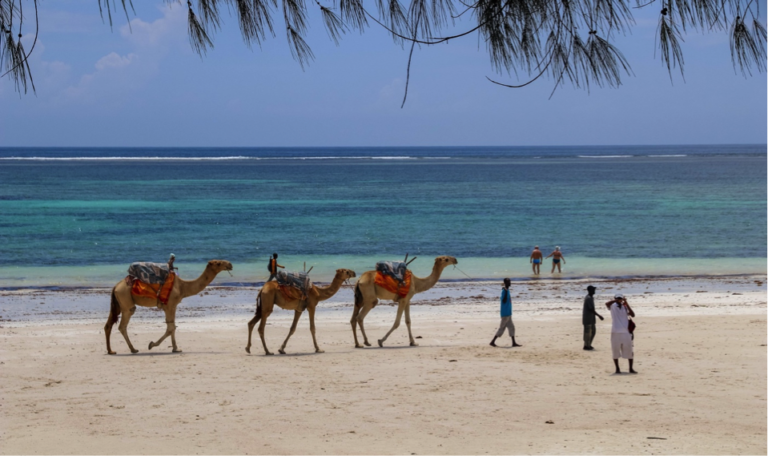Rethinking Tourism During the COVID-19 Pandemic: Successes of Local and “Work from Anywhere” Tourism in Coastal Kenya

Nikolina Zenovic, Research Fellow, African Political Economy Policy Lab1I would like to thank Dr. John Marangos, Cornelius Apungwa, Alex Kopytko, Michael Keen, Pambi Nzunga, and the African Political Economy Policy Lab for their comments and support.
Tourism plays a significant role in the economies of various African countries. The COVID-19 pandemic, however, has had a devastating impact on the industry’s viability. Lockdowns and travel restrictions have prompted the industry to revamp local tourism, and the transition to remote work in the pandemic era may provide an additional source of tourists. This paper examines the prospects of Kenyan coastal tourism in 2021. It concludes that the achievements of some Kenyan coastal tourism businesses – serving long-term, remote visitors and locals – may facilitate the economic recovery of Kenya’s coastal tourism in this mid-pandemic phase.
Introduction
Tourism has increasingly contributed to certain African economies, with the industry accounting for approximately seven percent of the continent’s GDP in 2019.2Olivier Monnier. “A Ticket to Recovery: Reinventing Africa’s Tourism Industry,” International Finance Corporation, May 2021. https://www.ifc.org/wps/wcm/connect/news_ext_content/ifc_external_corporate_site/news+and+events/news/reinventing-africa-tourism Specifically, the tourism industry contributes to countries’ foreign exchange earnings, government revenues, job creation, and income generation, thereby stimulating investment and regional development.3Peter U. C. Dieke, “Tourism in Africa: Issues and Prospects,” in Sustainable Human Resource Management in Tourism: African Perspectives, ed. Tom Baum and Ann Ndiuini (April 12, 2020): 10. However, tourism revenues collapsed in 2020 due to the COVID-19 pandemic and subsequent border and venue closures. Although many potential tourists may still feel uncomfortable traveling, it is possible the tourism industry may experience better seasons in 2021. Kenya’s tourism sector has had a strong performance over the last few years, with it being a well-established tourist destination.4Dieke 2020, 19-20. Yet, Kenya’s tourism industry has not been immune to COVID-19’s widespread devastation. This paper comments on the prospects of Kenyan coastal tourism a year into the pandemic. Highlighting the cases of Lamu Island and Diani Beach, this paper demonstrates that, through creative pivots, there is hope that Kenyan coastal tourism in 2021 will be an improvement from that of 2020.
Kenya’s Tourism Industry and the COVID-19 Pandemic
The tourism industry is a significant contributor to the Kenyan economy, making up about nine percent of the country’s GDP.5“Keyboard Surfers: Remote Working is a Lifeline for Kenya’s Beach Resorts.” The Economist, The Economist Newspaper, March 13, 2021, https://www.economist.com/middle-east-and-africa/2021/03/11/remote-working-is-a-lifeline-for-kenyas-beach-resorts. Like many other countries, closures and restrictions in response to the COVID-19 pandemic severely impacted Kenya’s tourism industry.6Ibid. Indeed, given travel restrictions, many foreign tourists had their travel plans stalled, leading to roughly a three-quarters decrease in tourism to Kenya.7“Keyboard Surfers: Remote Working is a Lifeline for Kenya’s Beach Resorts” 2021. Consequently, this decrease in tourism had profound implications on the vibrant expatriate community that encouraged tourism development and the associated food, service, and manufacturing industries.8Dieke 2020, 20; Monnier 2021. 9“Keyboard Surfers: Remote Working is a Lifeline for Kenya’s Beach Resorts” 2021. 10Dieke 2020, 20. As a result of the pandemic and subsequent decrease in foreign tourists, the Kenyan tourism industry lost approximately $1 billion in revenue between January and October 2020.11“Kenyan Tour Guides Take COVID-19 Vaccine in Hopes of Tourism Revival.” Reuters, April 27, 2021, https://www.reuters.com/world/africa/kenyan-tour-guides-take-covid-19-vaccine-hopes-tourism-revival-2021-04-27/. However, the situation may change this season as many people are eager to travel after lockdowns and restrictions the previous year.
While an increase in tourists will greatly benefit the industry financially, it does pose apparent risks of infection. These risks may threaten the ability of businesses to remain open and effectively serve customers as a high infection rate may result in national or local restrictions such as lockdowns or curfews. Therefore, to facilitate a healthy and safe experience for both tourists and locals, members of the tourism industry should continue to be proactive in responding to COVID-19 policies and implementing proactive and protective measures. The tourism industry relies on national and local governmental decisions concerning COVID-19-based social distancing requirements, mask mandates, curfews, and complete travel restrictions. The situation with the pandemic has fluctuated over the last year and a half. As a result, flexibility and adaptability will be essential to accommodate changing pandemic-related policies.
A joint message by the African Civil Aviation Commission (AFCAC), the African Airlines Association (AFRAA), the Airports Council International Africa (ACI Africa), the Civil Air Navigation Services Organisation (CANSO), the International Air Transport Association (IATA), and the United Nations World Tourism Organisation (UNWTO) outlines the following steps to facilitate travel industry recovery: (1) harmonization of travel protocols across governments, aviation authorities, and travel and tourism industry members; (2) accessibility of COVID-19 testing and reduction of PCR test costs; (3) advancement of vaccine roll-out; (4) lifting of travel restrictions; and (5) adopting globally recognizable digital health passes.12“Imperatives For A Sustainable Recovery Of The Air Travel Industry In Africa,” Press Release, HospitalityNet, May 26, 2021, https://www.hospitalitynet.org/news/4104577.html. Further, some businesses have successfully adapted to pandemic-related restrictions by adjusting deposit policies and payment flexibility.13“Covid-19 Promise,” Wildlife Trails, 2021, https://www.wildlifetrails.co.uk/covid19promise. If implemented by small businesses along Kenya’s coast, such modifications that emphasize service flexibility and traveler safety may help further stimulate tourism in the region.
Lamu Island, Diani Beach, and Working Remotely
Some businesses on Kenya’s Lamu Island and Diani Beach have had success in implementing these flexible and creative modifications. Throughout the years, Kenya’s Lamu Island has been a popular international celebrity holiday destination.14Tibbs Jenkins. “Lockdown in Lamu: Why Londoners Flocked to the Kenyan Hotspot During the Pandemic – and Never Came Back,” Evening Standard, April 6, 2021. https://www.standard.co.uk/escapist/travel/lamu-travel-guide-a4369901.html. During the pandemic, the island has experienced substantial visitations from those seeking to escape lockdowns in their respective countries.15Stephanie Linning. “Too Posh for Dubai? Live it up on Lamu! How Lady Lola Bute, Dominic West and Charlotte Tilbury Led the Escape to the (Almost) Covid-free Kenyan Island with no Masks or Quarantine Where Princess Beatrice’s In-Laws Have a Home,” Daily Mail, April 1, 2021, https://www.dailymail.co.uk/femail/article-9426689/Bored-Dubai-Live-Lamu.html. Lamu’s Shela Beach has reportedly hosted numerous celebrities throughout 2021, contributing to the island’s relative surge in tourism despite the circumstances of the pandemic era.16Ibid. For example, The Peponi Hotel, a popular accommodation on the island, experienced many weekends booked to capacity and even had its best season in January 2021, with about 80 percent occupancy.17“Why Well-Heeled Travellers are Flocking to Kenya During Lockdown,” Independent, April 2, 2021, https://www.independent.co.uk/travel/africa/kenya-lockdown-british-travel-holiday-b1823077.html. Furthermore, many visitors decided to extend their stays upon realizing they can work remotely from the Island.[xviii] Similarly, Diani Beach, just south of Mombasa, has been a hotspot for tourism. While Lamu Island has catered to many celebrities and international guests over the past year, much of Diani Beach’s tourism comes from locals and those working remotely from the sandy beach.
The option to work remotely during the pandemic has generated new opportunities for forms of local work-tourism. Indeed, Kenya has successfully embraced local tourism as civilians opt to work remotely and thus relocate to the coast to avoid the bustle of the cities.18“Keyboard Surfers: Remote Working is a Lifeline for Kenya’s Beach Resorts” 2021. This attraction of locals and those traveling for remote work could be a beneficial and sustainable source of tourism for the future. Although Diani Beach experienced a difficult period under Kenya’s strict lockdown around March 2020, it has recovered well, given the circumstances.19“Why Well-Heeled Travellers are Flocking to Kenya During Lockdown,” April 2, 2021. In the case of the Heavenly Garden rental villa in Diani Beach, bookings before the pandemic were predominantly (90 percent) short-term stays.20“Keyboard Surfers: Remote Working is a Lifeline for Kenya’s Beach Resorts,” 2021. However, this number has reversed since the pandemic to favor long-term stays (90 percent) as visitors flock to the coast to work remotely.[xmfn]Ibid.[/mfn] Thus, it appears that some tourism-oriented businesses, such as the Heavenly Garden, have efficiently pivoted their services. The success of this turn to accommodate those traveling for remote work expands conceptions of tourism to consider the effect of work-tourism where people now have the flexibility to work from anywhere and may choose long-term stays in different places.
Increasing Local Tourism
Although the pandemic has encouraged this shift to serve tourists working remotely, it has simultaneously exposed the Kenyan tourism sector’s dependence on foreign tourists.21Monnier, 2021. As the pandemic limited foreign tourism, a solution to this dependence is to look inward and focus on cultivating interest in tourism among locals. Domestic tourism constituted approximately 55 percent of Africa’s travel and tourism spending in 2019.22Ibid. Kenya has been a leader in promoting local tourism, with a rise of a domestic tourism market among the Kenyan middle class positively impacting the industry.23Ibid. To increase local tourism, Kenya eliminated entry fees to its game parks and reserves.24Ibid. Increasing such accessible tourism options for locals could be a sustainable solution that encourages Kenyans to explore their country affordably whilst also supporting local businesses. Creating infrastructures and encouragement for local tourism can help expand the industry’s customer base, thereby improving its resilience.25Ibid. Furthermore, a focus on creating and facilitating existing safe and affordable attractions, accommodations, and access/infrastructure for locals and foreigners can help sustainably develop tourism in Kenya and be emulated throughout the continent.26Dieke 2020, 23-24.
Conclusion
The success of businesses serving remote workers suggests the potential to encourage other areas that rely on tourism to provide opportunities catered to remote workers and locals. Indeed, the achievements of some tourism businesses on Lamu Island and at Diani Beach demonstrate the potential for economic recovery along Kenya’s coast. Even during the mid-pandemic, Kenya’s coastal tourism industry has seen improvements with businesses adapting and pivoting to (1) serve long-term visitors working remotely and (2) arrange further opportunities for domestic tourists. Refashioning tourism to accommodate remote workers and locals may be a sustainable path for Lamu Island and Diani Beach’s tourism industries through the pandemic. The 2021 season will undoubtedly be difficult for the Kenyan tourism sector. Nonetheless, there is hope that the flexibility tourism providers have learned over the last year and a half will improve this season upon the prior.
Based on your interests, you may also wish to read:
- How Can Sub-Saharan African Countries Minimize the Impact of Coronavirus Pandemic on Economic Performance?
- Africa, COVID-19, and the International Financial Institutions
- Restarting Growth in Countries with Ongoing Conflicts After Covid-19
- To Benefit from the Belt & Road Initiative, Africa Needs a Unified Approach


